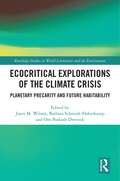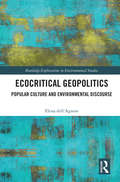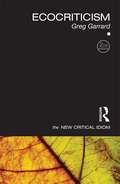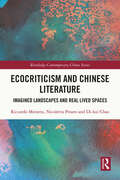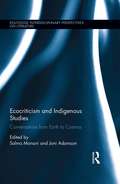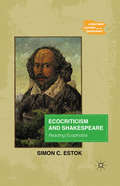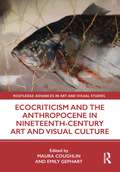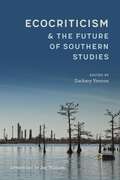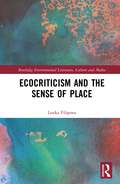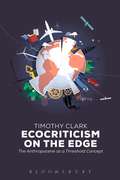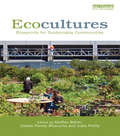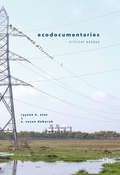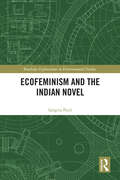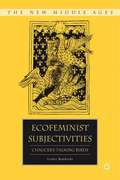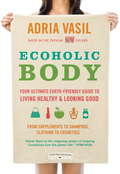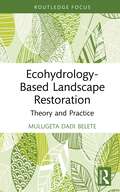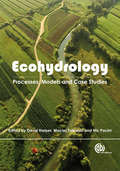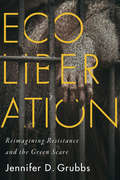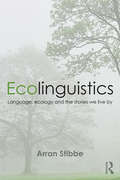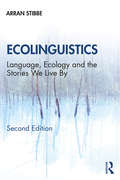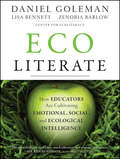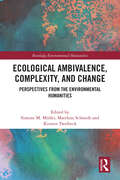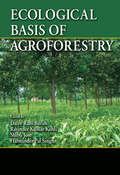- Table View
- List View
Ecocritical Explorations of the Climate Crisis: Planetary Precarity and Future Habitability (Routledge Studies in World Literatures and the Environment)
by Om Prakash Dwivedi Barbara Schmidt-Haberkamp Janet M. WilsonEcocritical Explorations of the Climate Crisis expands postcolonial precarity studies by addressing the current climate crisis and threats to the habitability of the planet from a range of ecocritical and environmental perspectives. The collection uses planetary thought-action praxis that acknowledges the interconnectedness of all forms of life in addressing the socioecological issues facing humanity: accelerating climate change, over-exploitation of natural resources, and the Global North–South divide. With reference to contemporary cultural productions, such praxis seeks to examine the ideas, images, and narratives that either represent or impede potential disasters like the so-called sixth extinction of the planet, that inspire the dismantling of carbon democracies arising in the wake of neoliberalism, and that address rising inequality with precarious conditions in the transition to renewable energy. The different chapters explore literary and visual representations of planetary precarity, identifying crisis-responsive genres and cultural formats, and assessing approaches to environment-re/making that call for repair, recovery and sustainability. In imagining future habitability, they deploy diverse critical frameworks such as queer utopias, zero-waste lifestyles, alternative ecologies, and adaptations to the uninhabitable. The collection tackles problems of global vulnerability and examines precarity as a condition of resilience and resistance through collective actions and solidarities and innovative constructions of the planet’s survival as a shared home. It engages with current postcolonial debates, uses intersectional methodologies, and introduces contemporary literary, visual concepts, and narrative types.
Ecocritical Geopolitics: Popular culture and environmental discourse (Routledge Explorations in Environmental Studies)
by Elena dell'AgneseWhat is the role of popular culture in shaping our discourse about the multifaceted system of material things, subjects and causal agents that we call "environment"? Ecocritical Geopolitics offers a new theoretical perspective and approach to the analysis of environmental discourse in popular culture. It combines ecocriticial and critical geopolitical approaches to explore three main themes: dystopian visions, the relationship between the human, post-human, and "nature" and speciesism and carnism. The importance of popular culture in the construction of geopolitical discourse is widely recognized. From ecocriticism, we also appreciate that literature, cinema, or theatre can offer a mirror of what the individual author wants to communicate about the relationship between the human being and what can be defined as non-human. This book provides an analysis of environmental discourses with the theoretical tools of critical geopolitics and the analytical methodology of ecocriticism. It develops and disseminates a new scientific approach, defined as "ecocritical geopolitics", to offer an idea of the power of popular culture in the realization of environmental discourse. Referencing sources as diverse as The Road, The Shape of Water, Lady and the Tramp, and TV cooking shows, this book will be of great interest to students and scholars of geography, environmental studies, film studies, and environmental humanities.
Ecocriticism (The New Critical Idiom)
by Greg GarrardEcocriticismexplores the ways in which we imagine and portray the relationship between humans and the environment in all areas of cultural production, from Wordsworth and Thoreau through to Google Earth, J. M. Coetzee and Werner Herzog's Grizzly Man. Greg Garrard's animated and accessible volume traces the development of the movement and explores its key concepts, including: pollution wilderness apocalypse dwelling animals earth. Featuring a newly rewritten chapter on animal studies, and considering queer and postcolonial ecocriticism and the impact of globalisation, this fully updated second edition also presents a glossary of terms and suggestions for further reading in print and online. Concise, clear, and authoritative, Ecocriticismoffers the ideal introduction to this crucial subject for students of literary and cultural studies.
Ecocriticism and Chinese Literature: Imagined Landscapes and Real Lived Spaces (Routledge Contemporary China Series)
by Riccardo MorattoFocusing on ecocritical aspects throughout Chinese literature, particularly modern and contemporary Chinese literature, the contributors to this book examine the environmental and ecological dimensions of notions such as qing (情) and jing (境). Chinese modern and contemporary environmental writing offers a unique aesthetic perspective toward the natural world. Such a perspective is mainly ecological and allows human subjects to take a benign and nonutilitarian attitude toward nature. The contributors to this book demonstrate how Chinese literary ecology tends toward an ecological-systemic holism from which all human behaviors should be closely examined. They do so by examining a range of writers and genres, including Liu Cixin’s science fiction, Wu Ming-yi’s environmental fiction, and Zhang Chengzhi’s historical narratives. This book provides valuable insights for scholars and students looking to understand how Chinese literature conceptualizes the relationship between humanity and nature, as well as our role and position within the natural realm.
Ecocriticism and Indigenous Studies: Conversations from Earth to Cosmos (Routledge Interdisciplinary Perspectives on Literature)
by Joni Adamson Salma MonaniThis book addresses the intersections between the interdisciplinary realms of Ecocriticism and Indigenous and Native American Studies, and between academic theory and pragmatic eco-activism conducted by multiethnic and indigenous communities. It illuminates the multi-layered, polyvocal ways in which artistic expressions render ecological connections, drawing on scholars working in collaboration with Indigenous artists from all walks of life, including film, literature, performance, and other forms of multimedia to expand existing conversations. Both local and global in its focus, the volume includes essays from multiethnic and Indigenous communities across the world, visiting topics such as Navajo opera, Sami film production history, south Indian tribal documentary, Maori art installations, Native American and First Nations science-fiction literature and film, Amazonian poetry, and many others. Highlighting trans-Indigenous sensibilities that speak to worldwide crises of environmental politics and action against marginalization, the collection alerts readers to movements of community resilience and resistance, cosmological thinking about inter- and intra-generational multi-species relations, and understandings of indigenous aesthetics and material ecologies. It engages with emerging environmental concepts such as multispecies ethnography, cosmopolitics, and trans-indigeneity, as well as with new areas of ecocritical research such as material ecocriticism, biosemiotics, and media studies. In its breadth and scope, this book promises new directions for ecocritical thought and environmental humanities practice, providing thought-provoking insight into what it means to be human in a locally situated, globally networked, and cosmologically complex world.
Ecocriticism and Shakespeare
by Simon C. EstokThis book offers the term 'ecophobia' as a way of understanding and organizing representations of contempt for the natural world. Estok argues that this vocabulary is both necessary to the developing area of ecocritical studies and for our understandings of the representations of 'Nature' in Shakespeare.
Ecocriticism and the Anthropocene in Nineteenth-Century Art and Visual Culture (Routledge Advances in Art and Visual Studies)
by Maura CoughlinIn this volume, emerging and established scholars bring ethical and political concerns for the environment, nonhuman animals and social justice to the study of nineteenth-century visual culture. They draw their theoretical inspiration from the vitality of emerging critical discourses, such as new materialism, ecofeminism, critical animal studies, food studies, object-oriented ontology and affect theory. This timely volume looks back at the early decades of the Anthropocene to query the agency of visual culture to critique, create and maintain more resilient and biologically diverse local and global ecologies.
Ecocriticism and the Future of Southern Studies
by Lisa Hinrichsen Christopher Lloyd Joseph Thompson John Moran Scott Romine Jay Watson Robert Azzarello Evangelia Kindinger Delia Byrnes Sam Horrocks Sarah McFarland Joshua Myers Scott Obernesser Lucas Sheaffer Jimmy Dean Smith Daniel Spoth Ila Tyagi Jonathan VillalobosAs the planet faces ever-worsening disruptions to global ecosystems—carbon and chemical emissions, depletions of the ozone layer, the loss of biodiversity, rising sea levels, air toxification, and worsening floods and droughts—scholars across academia must examine the cultural effects of this increasingly postnatural world. That task proves especially vital for southern studies, given how often the U.S. South serves as a site for large-scale damming initiatives like the TVA, disasters on the scale of Hurricane Katrina and the Deepwater Horizon spill, and the extraction of coal, oil, and natural gas. Ecocriticism and the Future of Southern Studies is the first book-length collection of scholarship that applies interdisciplinary environmental humanities research to cultural analyses of the U.S. South. Sixteen essays examine novels, nature writing, films, television, and music that address a broad range of ecological topics related to the region, including climate change, manmade and natural environments, the petroleum industry, food cultures, waterways, natural and human-induced disasters, waste management, and the Anthropocene. Edited by Zackary Vernon, this volume demonstrates how the greening of southern studies, in tandem with the southernization of environmental studies, can catalyze alternative ways of understanding the connections between regional and global cultures and landscapes. By addressing ecological issues central to life throughout the South, Ecocriticism and the Future of Southern Studies considers the confluence between region and environment, while also illustrating the growing need to see environmental issues as matters of social justice.
Ecocriticism and the Sense of Place (Routledge Environmental Literature, Culture and Media)
by Lenka FilipovaThe book is an investigation into the ways in which ideas of place are negotiated, contested and refigured in environmental writing at the turn of the twenty-first century. It focuses on the notion of place as a way of interrogating the socio-political and environmental pressures that have been seen as negatively affecting our environments since the advent of modernity, as well as the solutions that have been given as an antidote to those pressures. Examining a selection of literary representations of place from across the globe, the book illuminates the multilayered and polyvocal ways in which literary works render local and global ecological relations of places. In this way, it problematises more traditional environmentalism and its somewhat essentialised idea of place by intersecting the largely Western discourse of environmental studies with postcolonial and Indigenous studies, thus considering the ways in which forms of emplacement can occur within displacement and dispossession, especially within societies that are dealing with the legacies of colonialism, neocolonial exploitation or international pressure to conform. As such, the work foregrounds the singular processes in which different local/global communities recognise themselves in their diverse approaches to the environment, and gestures towards an environmental politics that is based on an epistemology of contact, connection and difference, and as one, moreover, that recognises its own epistemological limits. This book will appeal to researchers working in the fields of environmental humanities, postcolonial studies, Indigenous studies and comparative literature.
Ecocriticism in the Modernist Imagination
by Kelly SultzbachAlthough modernism has traditionally been considered an art of cities, Ecocriticism in the Modernist Imagination claims a significant role for modernist texts in shaping environmental consciousness. Analyzing both canonical and lesser-known works of three key figures - E. M. Forster, Virginia Woolf, and W. H. Auden - Sultzbach suggests how the signal techniques of modernism encourage readers to become more responsive to the animate world and non-human minds. Understanding the way these writers represent nature's agency becomes central to interpreting the power dynamics of empire and gender, as well as experiments with language and creativity. The book acknowledges the longer pastoral tradition in literature, but also introduces readers to the newly expanding field of ecocriticism, including philosophies of embodiment and matter, queer ecocriticism, and animal studies. What emerges is a picture of green modernism that reifies our burgeoning awareness of what it means to be human within a larger living community.
Ecocriticism on the Edge: The Anthropocene as a Threshold Concept
by Timothy ClarkThe twenty-first century has seen an increased awareness of the forms of environmental destruction that cannot immediately be seen, localised or, by some, even acknowledged. Ecocriticism on the Edge explores the possibility of a new mode of critical practice, one fully engaged with the destructive force of the planetary environmental crisis. Timothy Clark argues that, in literary and cultural criticism, the "Anthropocene", which names the epoch in which human impacts on the planet's ecological systems reach a dangerous limit, also represents a threshold at which modes of interpretation that once seemed sufficient or progressive become, in this new counterintuitive context, inadequate or even latently destructive. The book includes analyses of literary works, including texts by Paule Marshall, Gary Snyder, Ben Okri, Henry Lawson, Lorrie Moore and Raymond Carver.
Ecocultures: Blueprints for Sustainable Communities
by Jules Pretty Steffen Böhm Zareen BharuchaThe world faces a ‘perfect storm’ of social and ecological stresses, including climate change, habitat loss, resource degradation and social, economic and cultural change. In order to cope with these, communities are struggling to transition to sustainable ways of living that improve well-being and increase resilience. This book demonstrates how communities in both developed and developing countries are already taking action to maintain or build resilient and sustainable lifestyles. These communities, here designated as ‘Ecocultures’, are exemplars of the art and science of sustainable living. Though they form a diverse group, they organise themselves around several common organising principles including an ethic of care for nature, a respect for community, high ecological knowledge, and a desire to maintain and improve personal and social wellbeing. Case studies from both developed and developing countries including Australia, Brazil, Finland, Greenland, India, Indonesia, South Africa, UK and USA, show how, based on these principles, communities have been able to increase social, ecological and personal wellbeing and resilience. They also address how other more mainstream communities are beginning to transition to more sustainable, resilient alternatives. Some examples also illustrate the decline of ecocultures in the face of economic pressures, globalisation and climate change. Theoretical chapters examine the barriers and bridges to wider application of these examples. Overall, the volume describes how ecocultures can provide the global community with important lessons for a wider transition to sustainability and will show how we can redefine our personal and collective futures around these principles.
Ecodocumentaries
by Rayson K. Alex S. Susan DeborahThis book features ten critical essays on ecodocumentaries written by eminent scholars from India, USA, Ireland, Finland and Turkey in the area of ecocinema studies. Situating social documentaries with explicit ecological form and content, the volume takes relational positions on political, cultural and conservational aspects of natures and cultures in various cultural contexts. Documentaries themed around issues such as electronic waste, animal rights, land ethics, pollution of river, land grabbing, development and exotic plants are some of the topics ecocritiqued in this volume.
Ecofeminism and the Indian Novel (Routledge Explorations in Environmental Studies)
by Sangita PatilEcofeminism and the Indian Novel tests the theories of ecofeminism against the background of India’s often different perceptions of environmental problems, challenging the hegemony of Western culture in thinking about human problems. This book moves beyond a simple application of the concepts of ecofeminism, instead explaining the uniqueness of Indian novels as narratives of ecofeminism and how they can contribute to the development of the theory of ecofeminism. In examining a selection of novels, the author argues that Indian texts conceptualize the ecological crisis more as a human problem than as a gender problem. The book proposes that we should think of ecofeminism as ecohumanism instead, seeing human beings and nature as a part of a complex web. Novels analysed within the text include Kamala Markandaya’s Nectar in a Sieve (1954), Shivram Karanth’s Return to Earth (2002) and Na D’Souza’s Dweepa (2013). Ecofeminism and the Indian Novel will be of great interest to students and scholars of ecofeminism, ecocriticism, ecological feminism, environmental humanities, gender studies, ecological humanities, feminist studies and Indian literature.
Ecofeminist Approaches to Early Modernity
by Jennifer Munroe Rebecca LarocheChallenges the notion of how early modern women may or may not have spoken for (or even with) nature. By focusing on various forms of 'dialogue,' these essays shift our interest away from speaking and toward listening, to illuminate ways that early modern Englishwomen interacted with their natural surroundings.
Ecofeminist Subjectivities
by Lesley KordeckiThis bookanalyzes theinteraction between gender and species in Chaucer's poetry and strives to understand his adaptation of medieval discourse through an ecofeminist lens. Works that either speak of animals, or more pertinently those with animals speaking, offer fruitful results in the attempt to understand the medieval textual handling of the 'others' of society. "
Ecoholic Body: Your Ultimate Earth-friendly Guide to Living Healthy and Looking Good
by Adria VasilAdria Vasil, Canada's straight-shooting green living expert, is back, and this time it's personal . . . care, that is. Her latest eco bible delivers the lowdown on virtually every product that comes into contact with our bodies. From the pollutants clogging your sinus meds all the way to the outlaw toxins leaching from your sandals, ECOHOLIC BODY has you covered, head to toe. Never shy to blow the whistle, Adria calls out supplement and shampoo makers that exaggerate their green cred. This witty, indispensable guide will arm you with the knowledge you need to keep you and your family healthy, happy and green, all while detoxing the planet. Look your best- "Mean 15" ingredients to avoid- Skin care reviews for moisturizers, sunscreen, anti-aging and acne- Fresh ways to fight funk from bad breath to B.O.- Toxin-free hair care that works- The lowdown on mineral makeup, natural cosmetics, tattoos and more Feel your best- Nature's best remedies and superfoods that are good for the planet and your body- Greening your health care- Pollution-triggered health problems- Ecoholic weight loss plan- Greener birth control, local sex toys and more Dress your best- All the latest eco fashions, including activewear, maternity clothes, lingerie, menswear, footwear, jewellery, wedding dresses and more Give your kids nature's best- Toxin-free bum balms, shampoos, bubble bath, oils and powders- Green diaper reviews- The scoop on kids' PJs, clothes, charms And more- Exhaustive testing guides for everything from natural deodorant to herbal shampoos- Made-in-Canada products and services- Coast-to-coast store directory- DIY recipes for homemade body care- Money-saving tips in every chapterose hands touched? She rehearsed the questions she wondered if she would ever be able to ask. Why do you do it? Is it necessary to your poetry? Why did you choose this job? Or did it choose you?-- from The Murder RoomFrom the Hardcover edition.
Ecohydrology-Based Landscape Restoration: Theory and Practice (Routledge Focus on Environment and Sustainability)
by Mulugeta Dadi BeleteThis book provides an introduction to a fairly new approach to natural resources management practice entitled ecohydrology-based landscape restoration. Ecohydrology-based landscape restoration integrates landscape restoration practices with ecohydrology science and principles in order to help address the limitations of current management practices in developing countries. Focusing on both the theory and practice of implementing new management practices, the book includes conceptual designs and practical demonstrations for a variety of sites, including hillsides, farmlands, gullies, riparian buffers and wetlands, while also drawing on field research conducted in Ethiopia. The book puts forward principles for improving current practices, which include the better integration of hydrological and ecological concerns, the greater involvement of local communities, the adoption of indigenous practices, the establishment of green and semi-grey infrastructure as an ecohydrological systemic solution and the necessity of taking an adaptive approach to managing landscapes. This book will be of great interest to students and scholars of water resource management, ecohydrology and landscape restoration as well as professionals involved in the restoration of landscapes in developing countries.
Ecohydrology: An Approach to the Sustainable Management of Water Resources
by Maciej Zalewski Nic Pacini David HarperEcohydrology is an emerging new sub-discipline which links elements of ecology with hydrology at all points in the water cycle, ranging in scale from water-plant physiological relationships to whole catchment water-ecosystem processes. This book pays most attention to the larger scales of ecohydrology, emphasizing the use of this tool in striving towards the goal of sustainable water management. Authors from Eastern and Western Europe, America, Australia and South Africa give a broad global context.
Ecoliberation: Reimagining Resistance and the Green Scare (Outspoken)
by Jennifer D. GrubbsDisenchanted by indirect forms of protest designed to work within existing systems of corporate and state power, animal and earth liberation activists have turned instead to direct action. In this detailed ethnographic account Jennifer Grubbs takes the reader inside the complicated, intricate world of these powerful and controversial interventions, nuancing the harrowing realities of political repression with the inspiring, clever ways that activists resist.Grubbs draws on her personal experiences within the movement to offer a thoughtful and intersectional analysis. Tracing the strategies of liberationist activists as they grapple with doing activism under extreme repression, Ecoliberation challenges ubiquitous frameworks that position protestors as either good or bad by showing how activists playfully and confrontationally enact radical social change. Nearly a decade in the making, the book looks back at the notorious period of repression called the Green Scare and draws contemporary connections to the creep of fascism under President Donald Trump.In stories that are simultaneously heartbreaking, riddled with tension and contradiction, and inspiring, Grubbs proves that whether or not the revolution is televised, it will be spectacular.
Ecolinguistics: Language, Ecology and the Stories We Live By
by Arran StibbeThe increasingly rapid destruction of the ecological systems that support life is calling into question some of the fundamental stories that we live by: stories of unlimited economic growth, of consumerism, progress, individualism, success, and the human domination of nature. Ecolinguistics shows how linguistic analysis can help reveal the stories we live by, open them up to question, and contribute to the search for new stories. Bringing together the latest ecolinguistic studies with new theoretical insights and practical analyses, this book charts a new course for ecolinguistics as an engaged form of critical enquiry. Featuring: A framework for understanding the theory of ecolinguistics and applying it practically in real life; Exploration of diverse topics from consumerism in lifestyle magazines to Japanese nature haiku; A comprehensive glossary giving concise descriptions of the linguistic terms used in the book; Discourse analysis of a wide range of texts including newspapers, magazines, advertisements, films, nonfiction books, and visual images. This is essential reading for undergraduates, postgraduates and researchers working in the areas of Discourse Analysis and Language and Ecology.
Ecolinguistics: Language, Ecology and the Stories We Live By (Bloomsbury Advances In Ecolinguistics Ser.)
by Arran StibbeEcolinguistics: Language, Ecology and the Stories We Live By is a ground-breaking book which reveals the stories that underpin unequal and unsustainable societies and searches for inspirational forms of language that can help rebuild a kinder, more ecological world. This new edition has been updated and expanded to bring together the latest ecolinguistic studies with new theoretical insights and practical analyses. The book presents a theoretical framework and practical tools for analysing the key texts which shape the society we live in. The theory is illustrated through examples, including the representation of environmental refugees in the media; the construction of the selfish consumer in economics textbooks; the parallels between climate change denial and coronavirus denial; the erasure of nature in the Sustainable Development Goals; creation myths and how they orient people towards the natural world; and inspirational forms of language in nature writing, Japanese haiku and Native American writing. This edition provides an updated theoretical framework, new example analyses, and an additional chapter on narratives. Accompanied by a free online course with videos, PowerPoints, notes and exercises (www.storiesweliveby.org.uk), as well as a comprehensive glossary, this is essential reading for undergraduates, postgraduates and researchers working in the areas of Discourse Analysis, Environmental Studies and Communication Studies.
Ecoliterate: How Educators Are Cultivating Emotional, Social, and Ecological Intelligence
by Daniel Goleman Lisa Bennett Zenobia BarlowA new integration of Goleman's emotional, social, and ecological intelligence Hopeful, eloquent, and bold, Ecoliterate offers inspiring stories, practical guidance, and an exciting new model of education that builds - in vitally important ways - on the success of social and emotional learning by addressing today's most important ecological issues. This book shares stories of pioneering educators, students, and activists engaged in issues related to food, water, oil, and coal in communities from the mountains of Appalachia to a small village in the Arctic; the deserts of New Mexico to the coast of New Orleans; and the streets of Oakland, California to the hills of South Carolina. Ecoliterate marks a rich collaboration between Daniel Goleman and the Center for Ecoliteracy, an organization best known for its pioneering work with school gardens, school lunches, and integrating ecological principles and sustainability into school curricula. For nearly twenty years the Center has worked with schools and organizations in more than 400 communities across the United States and numerous other countries. Ecoliterate also presents five core practices of emotionally and socially engaged ecoliteracy and a professional development guide.
Ecological Ambivalence, Complexity, and Change: Perspectives from the Environmental Humanities (Routledge Environmental Humanities)
by Müller, Edited by Simone M.This book provides a systematic, interdisciplinary analysis of the conflicts, issues, and tensions associated with today’s ecological transformation processes from an Environmental Humanities perspective. It explores the notion of ecological ambivalence, where conflicting reactions, beliefs, or feelings toward public policies or private practices for "saving planet Earth" threaten to produce a stalemate.Under the umbrella of the Environmental Humanities, the book brings together scholars from fields such as environmental history, ecological economics, human geography, and ecocriticism. Contributions investigate the dissonances, or ambivalences, wound up with processes of environmental transformation both conceptually and empirically. Case studies range from wind farms in India to green mineral mines in Mexico, and from chemical contamination in Denmark to Rocky Mountain Arsenal in Denver, USA. Additionally, with a focus on creative environmental communication—as in Philippe Squarzoni’s graphic novel Climate Changed or G’Ebinyo Ogbowei’s poetry—contributions also present possible pathways for overcoming ambivalences, managing them creatively, or critiquing the concept as whole. The volume highlights how the humanities, the arts, and the social sciences can work together to help humankind develop and cultivate the skills to overcome paralysis and engage in practical action, and in doing so, puts forth ambivalence as an approach for being in today’s world.This book will be of interest to researchers, academics, and students from the Environmental Humanities, the social sciences, the humanities, and the environmental sciences. It will also be useful for decisionmakers, think tanks, NGOs, and activists.
Ecological Basis of Agroforestry
by Shibu Jose Ravinder Kumar Kohli Harminder Pal Singh Daizy Rani BatishFaced with the growing problems of climate change, ecosystem degradation, declining agricultural productivity, and uncertain food security, modern agricultural scientists look for potential relief in an ancient practice. Agroforestry, if properly designed, can mitigate greenhouse effects, maintain ecosystem health and biodiversity, provide food sec
